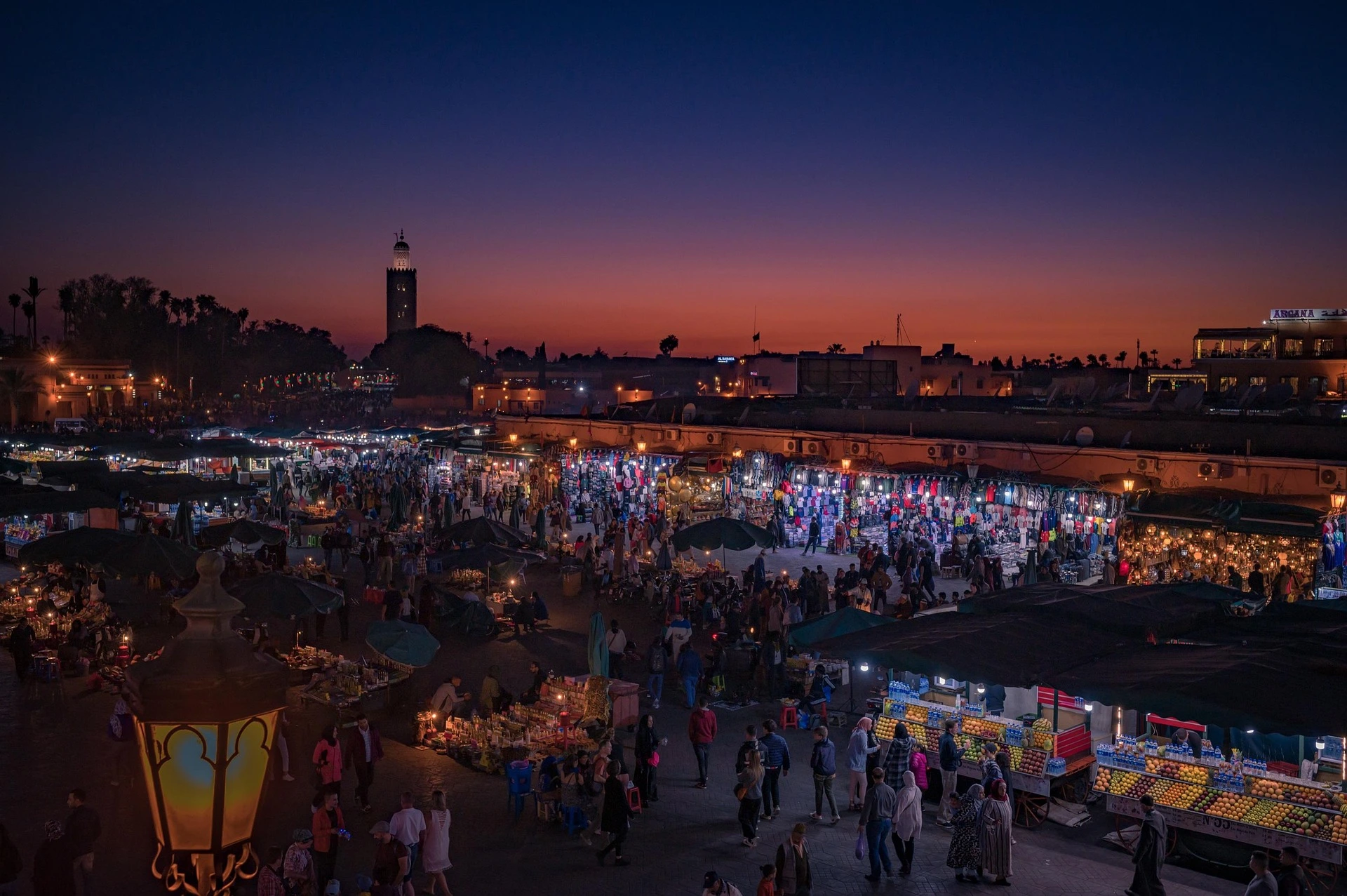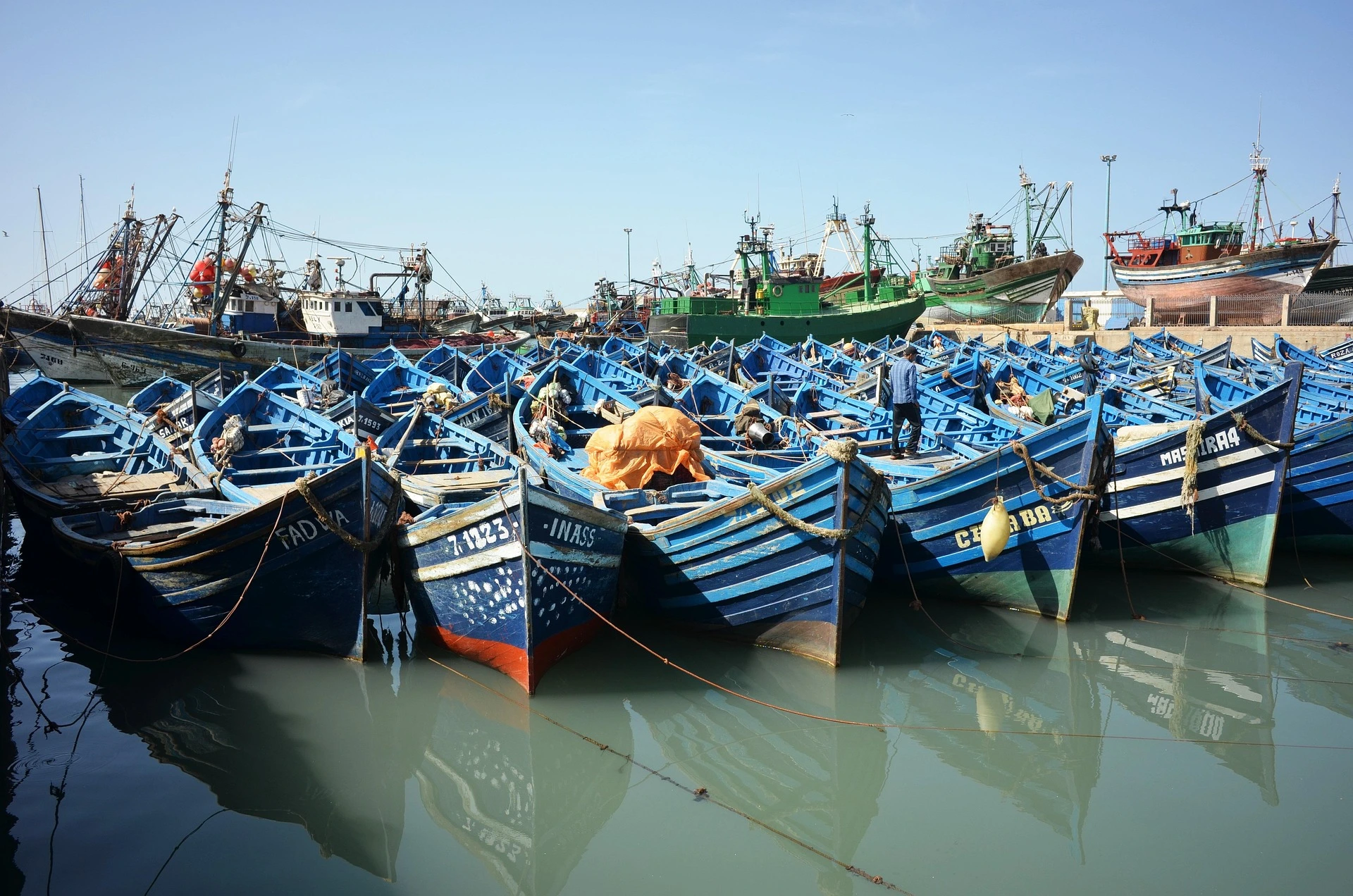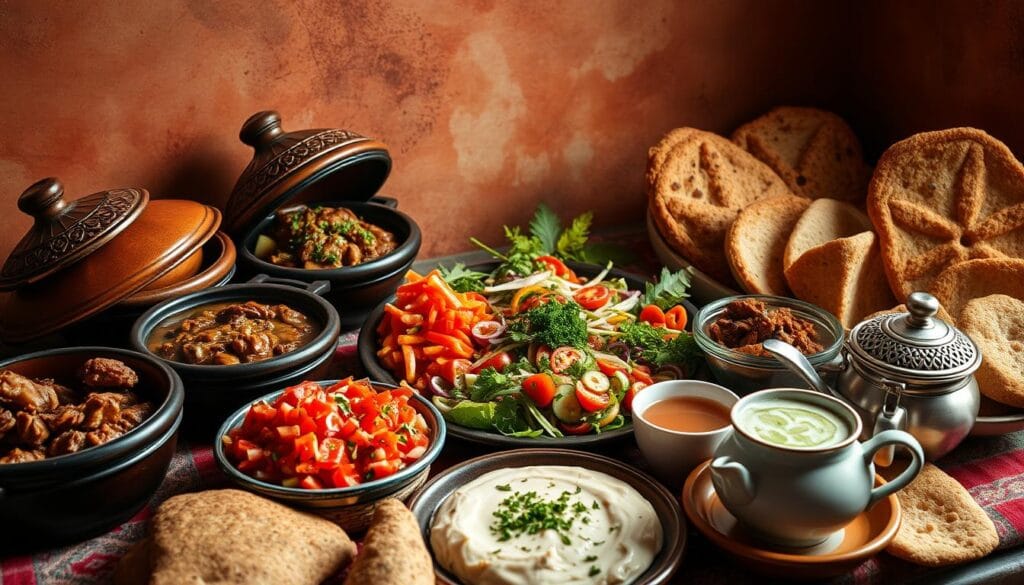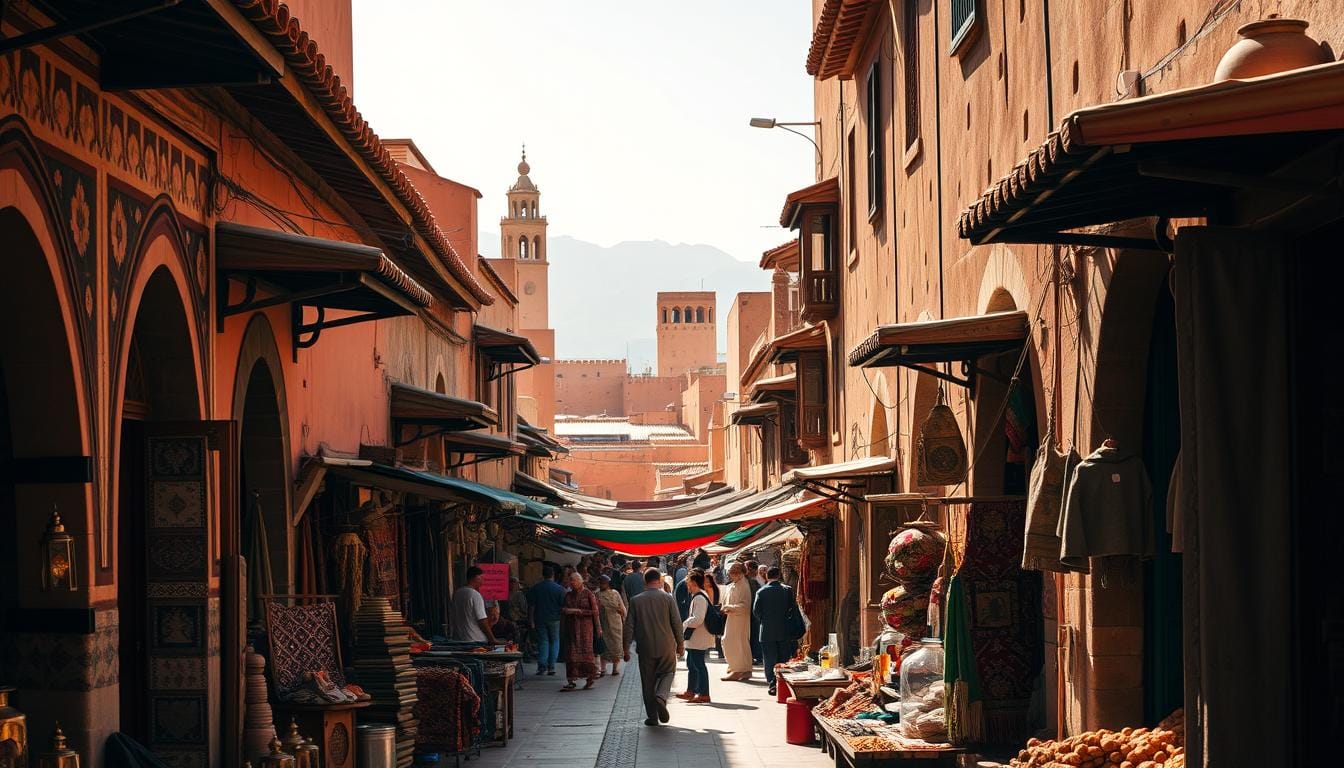Essential Morocco Travel Tips for First-Time Visitors
Essential Morocco Travel Tips for First-Time Visitors. As you prepare your Moroccan adventure, excitement and curiosity are natural companions. Morocco is a treasure trove of culture, history, and natural beauty, offering a unique experience that can be both exhilarating and overwhelming.
With rich cultural heritage and vibrant cities like Marrakech, you’ll want to be prepared to navigate bustling streets, immerse yourself in local customs, and make the most of your journey. This guide provides you with essential tips to ensure a smooth and enjoyable trip, covering everything from cultural insights to practical advice for exploring this captivating country.
Table of Contents
ToggleUnderstanding Morocco’s Cultural Richness
As you step into Morocco, you’re immediately immersed in a vibrant culture that reflects the country’s diverse heritage. Morocco’s cultural richness is a result of centuries of influences from Arab, Berber, and French traditions, among others.
Overview of Moroccan Culture
Moroccan culture is a blend of different ethnic and religious influences, creating a unique societal fabric. The country’s history, architecture, cuisine, and daily life all reflect this rich cultural diversity. From the bustling souks to the serene riads, every aspect of Moroccan life is infused with a deep sense of tradition and hospitality.
Cultural heritage plays a significant role in shaping the identity of Moroccans. The influence of Islam is evident in the beautiful mosques and the call to prayer that punctuates the day. The Berber culture, too, has left an indelible mark, particularly in the rural areas where traditional practices continue to thrive.
Essential Morocco Travel Tips for First-Time Visitors: Key Cultural Etiquettes
Understanding and respecting local customs is crucial when visiting Morocco. Here are some key cultural etiquettes to keep in mind:
- When greeting, use your right hand for shaking hands or giving/receiving something, as the left hand is considered impolite.
- Dress modestly, covering your shoulders and knees, especially when visiting mosques or rural areas.
- Remove your shoes before entering a mosque or a traditional riad.
- Be respectful of local traditions and avoid public displays of affection.
By being mindful of these cultural etiquettes, you can ensure a respectful and enjoyable interaction with the locals.
Language and Communication Tips
While Arabic is the official language, French is widely spoken, and many Moroccans in the tourism industry speak English. However, learning a few basic phrases in Arabic or Berber can go a long way in enhancing your experience.
Some essential phrases include “hello” (as-salamu alaykum), “thank you” (shukraan), and “how much?” (bekhalas?). Using these phrases shows respect for the culture and can lead to more meaningful interactions with the locals.
Additionally, being aware of non-verbal communication is important. For instance, using your right hand when eating or giving something is considered polite.
Best Times to Visit Morocco
The best time to visit Morocco varies based on your tolerance for heat, interest in festivals, and preference for fewer tourists. Morocco’s diverse climate means that the ideal visit time depends on the regions you plan to explore.

Seasonal Climate Overview
Morocco’s climate varies significantly across different regions. The coastal areas tend to be mild, while the Atlas Mountains can be cool, even in summer. In contrast, the Sahara Desert is hot during the day and cold at night.
Spring (March to May) is considered one of the best times to visit, with mild temperatures and fewer crowds. It’s ideal for exploring cities like Marrakech and Fes, as well as enjoying the outdoors.
Summer (June to August) is peak tourist season, with hot temperatures, especially in the desert regions. It’s perfect for those who enjoy warm weather and don’t mind the crowds.
Autumn (September to November) offers pleasant temperatures, making it another excellent time to visit. The crowds have dissipated, and the weather is conducive to sightseeing.
Winter (December to February) can be quite cool, especially in the mountains, where snow is not uncommon. It’s a good time for those interested in skiing or preferring cooler weather.
Festivals and Events to Experience
Morocco hosts various festivals and events throughout the year, adding to its cultural richness. Some notable events include:
- The Marrakech International Film Festival, attracting cinema enthusiasts.
- The Essaouira Gnawa Music Festival, celebrating Gnawa culture.
- The Fes Festival of World Sacred Music, showcasing diverse musical traditions.
These events offer a unique glimpse into Moroccan culture and are worth experiencing if you’re visiting during their respective times.
Off-Peak Travel Benefits
Traveling during the off-peak season can have several benefits, including lower prices for accommodations and fewer tourists, making for a more relaxed experience. You can enjoy popular attractions without the crowds, and you may find better deals on tours and activities.
However, it’s essential to consider the weather and potential closures of certain attractions during the off-season. Planning ahead and researching the specific conditions for your travel dates can help you make the most of your trip.
Must-See Destinations in Morocco
From the vibrant souks of Marrakech to the historical depths of Fes and the adventurous landscapes of the Sahara Desert, Morocco has something for every traveler. As you explore this captivating country, you’ll discover a wealth of unforgettable experiences that will leave you enchanted.
Marrakech: The Vibrant Heart
Marrakech is a sensory overload in the best possible way, with its bustling streets, vibrant markets, and stunning architecture. You can explore the famous Jardin Majorelle, a beautiful botanical garden created by French artist Jacques Majorelle, or get lost in the labyrinthine alleys of the old medina. Don’t miss the opportunity to experience a traditional Moroccan hammam, or relax with a soothing cup of tea in a local riad.
- Visiting the iconic Koutoubia Mosque
- Exploring the bustling Djemaa el-Fna square
- Shopping for local handicrafts in the souks
Fes: A Journey into History
Fes, the ancient capital of Morocco, is a city that feels like a step back in time. Its well-preserved medieval architecture, including the famous Al-Attarine Madrasa, is a testament to the country’s rich history. You can wander through the narrow streets of the old medina, visit the Dar Batha Museum, or simply soak up the atmosphere in this captivating city.
Some must-see attractions in Fes include:
- The University of Al Quaraouiyine, one of the oldest universities in the world
- The Bou Inania Madrasa, a masterpiece of Marinid architecture
- The ancient city gates, such as Bab Bou Jeloud
The Sahara Desert: A Unique Adventure
No trip to Morocco is complete without experiencing the breathtaking beauty of the Sahara Desert. You can take a guided tour into the desert, where you’ll have the opportunity to ride a camel, watch the stars twinkle to life in the night sky, or simply enjoy the serene silence of the dunes.
Some ways to experience the Sahara Desert include:
- Going on a camel trek through the dunes
- Camping under the stars in a desert camp
- Enjoying a thrilling dune bashing adventure
Whether you’re drawn to the vibrant energy of Marrakech, the historical significance of Fes, or the adventurous landscapes of the Sahara Desert, Morocco has a wealth of unforgettable destinations waiting to be explored.
Navigating Morocco: Transportation Options
Understanding the transportation landscape in Morocco is key to a smooth and enjoyable trip. Morocco offers a variety of transportation options, catering to different preferences and budgets.
Overview of Public Transport
Morocco’s public transport system is comprehensive, including buses, trains, and grand taxis. The ONCF train service is particularly efficient for long-distance travel, connecting major cities like Marrakech, Fes, and Rabat.
For shorter distances, buses are a popular choice, with Supratours offering comfortable and relatively affordable journeys. Grand taxis, which operate on fixed routes, are another option for shorter trips.

Renting a Car: What You Need to Know
Renting a car in Morocco gives you the freedom to explore at your own pace. Several international car rental companies have offices at airports and in city centers.
To rent a car, you’ll typically need a valid driver’s license, a credit card, and to be at least 21 years old. It’s also advisable to book in advance, especially during peak travel seasons.
- Choose a reputable rental company.
- Check the vehicle’s condition before you leave the rental lot.
- Consider the type of vehicle suitable for your itinerary (e.g., 4×4 for desert trips).
Tips for Taxis and Ride-Sharing Services
Taxis are a convenient way to get around cities. In major cities, you’ll find both petit taxis (for short journeys within a city) and grand taxis (for longer, inter-city trips).
Careem and Uber operate in some Moroccan cities, offering an alternative to traditional taxis. Always agree on the fare or ensure the meter is running before you start your journey.
- Use licensed taxis or ride-sharing services.
- Negotiate the fare in advance or ensure the meter is on.
- Be aware of your surroundings and keep your belongings secure.
Accommodation Choices for Travelers
Whether you’re looking for budget-friendly hostels or luxury resorts, Morocco’s accommodation options are vast. You can choose from traditional riads, modern hotels, or even luxury stays that offer a unique blend of traditional charm and modern amenities.
Traditional Riads vs. Hotels
Morocco is famous for its traditional riads, which are historic houses or palaces with interior gardens or courtyards. These riads have been converted into charming guesthouses, offering a unique and authentic experience. On the other hand, modern hotels provide comfort and convenience, often with amenities like pools, spas, and restaurants.
Riads offer an immersive cultural experience, with traditional architecture and decor. They are often family-run, providing a personal touch. Hotels, however, offer a more standardized experience, with predictable amenities and services.
Budget-Friendly Options
For travelers on a budget, Morocco offers a range of affordable accommodations. Hostels are a popular choice, offering dorm rooms and shared facilities. Many hostels also organize social events, making it easy to meet other travelers.
- Hostels: Affordable, social, and often centrally located.
- Guesthouses: Family-run, offering a homely atmosphere.
- Budget hotels: Simple, no-frills accommodation at affordable prices.
Luxury Stays in Morocco
For those seeking a luxurious experience, Morocco has plenty to offer. From five-star resorts to luxury riads, you can enjoy high-end amenities, gourmet dining, and exceptional service.
Luxury accommodations often come with exclusive experiences, such as private pools, spas, and guided tours. Some luxury riads are located in historic buildings, offering a unique blend of traditional and modern luxury.
Essential Moroccan Cuisine to Try
The essence of Moroccan cuisine lies in its bold flavors and aromatic spices, creating a sensory experience that is both exotic and inviting. As you explore the culinary delights of Morocco, you’ll encounter a rich gastronomic culture that reflects the country’s history and cultural diversity.
Top Dishes Every Visitor Should Taste
Moroccan cuisine offers a variety of dishes that are sure to tantalize your taste buds. Some of the top dishes to try include:
- Tagine: A slow-cooked stew named after the earthenware pot in which it’s cooked, typically made with meat, vegetables, and dried fruits.
- Couscous: A traditional North African dish made from semolina flour, often served with vegetables, meat, and sauce.
- Harira: A hearty soup made with tomatoes, lentils, chickpeas, and spices, commonly consumed as a starter or snack.

Best Places to Eat in Major Cities
Morocco’s major cities offer a range of dining experiences, from traditional riads to modern restaurants. Here are some top recommendations:
| City | Recommended Restaurant | Cuisine |
|---|---|---|
| Marrakech | Le Tobsil | Moroccan |
| Fes | Dar Roumana | Moroccan, Mediterranean |
| Rabat | La Veranda | French, Moroccan |
Street Food: A Culinary Adventure
Street food is an integral part of Moroccan cuisine, offering a quick and delicious way to experience local flavors. Be sure to try:
- Grilled Meats: Skewers of marinated meat grilled to perfection.
- Msemen: A type of pancake made with layers of dough, often served with honey or savory fillings.
- Fresh Juices: Freshly squeezed juices made from a variety of fruits, such as orange or pomegranate.
Exploring Moroccan cuisine is a journey of discovery, with each dish offering a glimpse into the country’s rich cultural heritage. Whether you’re dining in a riad, a restaurant, or sampling street food, you’re sure to enjoy the bold flavors and warm hospitality that Morocco is known for.
Shopping and Souks: What to Expect
In Morocco, shopping isn’t just a transaction; it’s an experience that unfolds in the vibrant souks, where every item tells a story. As you navigate through the bustling alleys, you’ll be surrounded by a kaleidoscope of colors, sounds, and aromas that will leave you enchanted.
Souk Etiquette and Bargaining Tips
Understanding souk etiquette is crucial for a smooth and enjoyable shopping experience. First, it’s essential to respect the local customs and traditions. When browsing through the stalls, don’t be afraid to touch and examine the products; it’s a way of showing interest. However, be mindful of your body language and avoid displaying excessive enthusiasm, as it can affect the bargaining process.
Here are some bargaining tips to keep in mind:
- Research the market value of the items you’re interested in beforehand.
- Start with a lower offer than you’re willing to pay.
- Be prepared to walk away if the price isn’t right.
- Build a rapport with the vendor; a smile and a friendly demeanor can go a long way.
Popular Crafts and Souvenirs
Morocco is renowned for its rich artisanal heritage, offering a diverse range of crafts and souvenirs that reflect its cultural identity. Some of the most sought-after items include:
| Craft | Description | Average Price |
|---|---|---|
| Handmade Carpets | Intricately woven carpets made from wool or silk. | $50-$200 |
| Tagine Pots | Traditional clay pots used for cooking tagines. | $20-$50 |
| Argan Oil Products | Cosmetic products made from the oil of the argan tree. | $10-$30 |
Areas to Explore for Unique Finds
Morocco’s souks are scattered across various cities, each offering a unique shopping experience. In Marrakech, the souks around the Jardin Majorelle and the Medina are must-visit destinations. For a more authentic experience, explore the local markets in smaller towns like Chefchaouen, known for its blue-painted buildings and relaxed atmosphere.
As you explore the souks, remember to stay hydrated, wear comfortable shoes, and be prepared for the crowds. With these tips and insights, you’re ready to embark on a shopping adventure in Morocco that will leave you with unforgettable memories and unique souvenirs.
Safety Tips for Travelers in Morocco
Morocco is generally a safe country, but taking certain precautions can significantly enhance your travel experience. Understanding the local culture, being aware of your surroundings, and knowing how to handle common scenarios can make your trip more enjoyable.
General Safety Guidelines
To ensure your safety in Morocco, it’s crucial to be mindful of your belongings, especially in crowded areas like souks and public transportation. Pickpocketing and petty theft can occur, so keep your valuables secure and consider using a money belt.
- Be cautious with your belongings in crowded areas.
- Avoid displaying signs of wealth (e.g., expensive jewelry or watches).
- Use reputable taxi services or ride-sharing apps.
Areas to Avoid
While Morocco is generally safe, there are areas that tourists should avoid, particularly at night. Some neighborhoods in larger cities can be less safe due to higher crime rates or other factors.
| City | Areas to Avoid | Safe Alternatives |
|---|---|---|
| Marrakech | Avoid the outskirts and less lit areas at night. | Stay in well-lit areas like Jemaa el-Fnaa. |
| Fes | Be cautious in the medina (old city) at night. | Explore the medina during the day and enjoy its historic charm. |
How to Handle Common Scenarios
In Morocco, you may encounter various scenarios, from aggressive vendors to minor scams. Staying calm and being prepared can help you navigate these situations effectively.
Tips for Handling Common Scenarios:
- Politely decline unwanted services or goods.
- Be aware of scams, such as fake guides or overpriced items.
- Keep your hotel or riad contact information handy.
By being informed and taking necessary precautions, you can have a safe and enjoyable trip to Morocco. Enjoy the rich culture, stunning landscapes, and warm hospitality that this beautiful country has to offer.
Connecting with Locals: Meeting Moroccans
Connecting with locals is a key part of any meaningful travel experience in Morocco. Engaging with the community can enrich your understanding of the culture and create lasting memories. Morocco is known for its warm hospitality, and with a few tips, you can make the most of your interactions.
Tips for Engaging with the Community
To truly connect with Moroccans, it’s essential to be respectful and open-minded. Start by learning a few basic Arabic phrases, such as “hello” (Marhaba) and “thank you” (Shukran). This simple gesture can go a long way in showing your respect for the culture. Additionally, be prepared to engage in conversations about local customs, traditions, and daily life.
Participate in Local Events: Attending local events, such as festivals or community gatherings, can provide valuable opportunities to meet locals. These events are a great way to experience Moroccan culture firsthand and make new friends.
Cultural Activities to Participate In
Morocco offers a wide range of cultural activities that you can participate in to deepen your understanding of the local way of life. Consider taking a cooking class to learn how to prepare traditional Moroccan dishes like tagine or couscous. You can also explore local workshops where artisans teach traditional crafts.
- Take a cooking class to learn traditional Moroccan recipes.
- Participate in a local craft workshop to learn about traditional artisans.
- Visit local markets (souks) to experience the vibrant culture.
Understanding Moroccan Hospitality
Moroccan hospitality is renowned worldwide, and experiencing it firsthand is a highlight of any trip to Morocco. Locals take great pride in welcoming guests into their homes and sharing their culture. When invited to a Moroccan home, be prepared to enjoy delicious food and warm conversation.
Reciprocating Hospitality: If you’re invited to a local’s home, consider bringing a small gift, such as sweets or pastries, as a token of appreciation. This gesture is a sign of respect and can help strengthen your connection with your host.
Understanding Moroccan Currency and Costs
To make the most of your Moroccan adventure, grasping the basics of its currency and expenses is essential. The Moroccan dirham (MAD) is the local currency. Understanding the dirham’s value and how to manage your money is crucial for a stress-free trip.
Currency Basics and Exchange Tips
Exchanging your money for dirhams upon arrival is a good idea. You can exchange currency at airports, banks, or currency exchange offices. It’s recommended to avoid exchanging money at hotels or tourist areas, as the rates may not be favorable. ATMs are widely available in cities and towns, allowing you to withdraw dirhams using your debit or credit card.
When using ATMs, be aware of any foreign transaction fees associated with your card. Some banks and credit card companies charge a fee for international transactions, so it’s a good idea to check with your bank before your trip.
Daily Budgeting for Travelers
Daily budgeting in Morocco can vary greatly depending on your travel style and accommodations. On average, a budget traveler can expect to spend around $30-50 per day, while mid-range travelers may spend $50-100 per day. Luxury travelers can expect to spend significantly more.
| Expense Category | Budget | Mid-range | Luxury |
|---|---|---|---|
| Accommodation | $10-20 | $30-60 | $100+ |
| Food | $5-10 | $15-30 | $30-50 |
| Transportation | $2-5 | $5-10 | $10-20 |
Tipping Culture in Morocco
Tipping in Morocco is customary, especially for services like tour guides, drivers, and restaurant staff. A general rule of thumb is to tip around 10% in restaurants and cafes if service is not included. For tour guides, a tip of 20-50 dirhams per day is considered appropriate, depending on the quality of service.
Understanding and respecting the local tipping culture can enhance your experience and interactions with locals.
Preparing for Your Trip: Final Checklist
As you finalize your plans for a trip to Morocco, it’s essential to ensure you have everything in order. From must-see attractions to a well-planned Morocco itinerary, being prepared will enhance your travel experience.
Documents and Packing
Verify that your passport is valid for at least six months beyond your planned departure date from Morocco. Make photocopies of important documents, such as your passport and travel insurance, and consider leaving a copy with a trusted friend or family member.
Health and Safety
Consult your doctor or a travel clinic about recommended vaccinations and medications for travel to Morocco. Take necessary precautions against heat and sun exposure, and stay informed about local health concerns.
Travel Insurance
Consider investing in travel insurance that covers unexpected medical or travel-related expenses. This can provide peace of mind as you embark on your Moroccan adventure.
By following this checklist, you’ll be well-prepared for a memorable and enjoyable trip to Morocco, exploring its must-see attractions and experiencing the rich cultural heritage.

